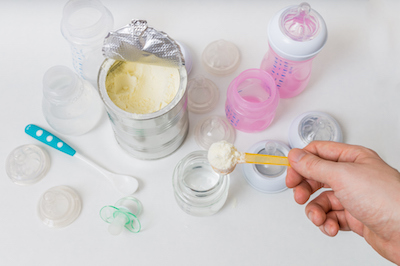How do I choose the right formula for my baby?
You’ve probably heard it said many times before that breast feeding provides optimal nutrition for your baby within the first year of life. Pediatricians recommend that infants are breastfed exclusively for the first six months of life, and then continue to receive breast milk along with solid foods until they reach twelve months of age (or longer, if desired.)
While breast milk is the ideal source of nutrition for babies, there are many occasions when breastfeeding isn’t possible or preferable, and formula can provide an alternative source of nutrition to ensure baby’s healthy growth. If you’ve walked down the aisle of your supermarket and perused all of the different formula options, though, you know it can be quite overwhelming. There’s one for digestive health, one for brain growth, and one for fussiness and gas as well as soy, organic, and non-GMO varieties- the list goes on and on!
Powder, liquid or concentrate?
Before you get overwhelmed by all of your options, choose which dosage form you’d like to use. Formula comes in powder form, as a ready-to-use liquid, or in a liquid concentrate where you’ll need to add water before feeding. Liquid formulations may prove to be more convenient, but they are also significantly more expensive than powder. Be sure you read the directions on the label of the formula you choose and follow them carefully. Don’t add more or less water than is directed, as this can cause serious problems for your baby.
Cow’s milk-based formulas
Most of the formula options you’ll see on the shelves are derived from cow’s milk. Although cow’s milk forms the base, the formula undergoes dramatic changes to mimic the makeup of breast milk and to make it safe and easy to digest for infants. Cow’s milk formula is also fortified with iron, which has dramatically reduced the number of infants who suffer from iron- deficiency anemia within the last few decades. This added iron is essential for baby’s growth and development, so you should never buy low-iron formulas unless specifically directed to do so by your doctor.
Soy formulas
Soy formulas incorporate soy protein and carbohydrates in the form of glucose or sucrose. These are sometimes recommended for infants who are cannot tolerate lactose, which is a primary ingredient of cow’s milk formula. While lactose intolerance is a widespread problem in older children and adults, it is relatively rare for infants to require a change in formula due to lactose intolerance.
Soy formulas may be an option for infants who have a true allergy to the protein found in cow’s milk. However, roughly half of the infants who have a true cow’s milk allergy also have a sensitivity to soy. If your baby is unable to consume cow’s milk or soy-based formulas, your doctor will recommend a specialized formula for him.
Some vegetarian families may prefer soy-based formulas, as they are made with no animal products. However, pediatricians agree that the best form of nutrition for vegetarians is breast milk. Still others may wish to use soy formulas due to the belief that soy can calm infants with gas or fussiness, but there is no evidence to support this claim.
The American Academy of Pediatrics has stated that there are only a few situations where it is beneficial to choose a soy formula over cow’s milk formula (as in the case of a cow’s milk allergy without sensitivity to soy, or other rare conditions). Without a compelling reason to choose a soy formula for a baby’s specific needs, cow’s milk formula is preferred when breast feeding isn’t possible.
Additives and “extras”
Many formulas now include DHA and ARA (docohexaenoic acid and arachidonic acid), which are thought to help brain and eye development, so you might like to include those.

You will encounter advertising for organic and non-GMO varieties of formula, but these are not necessary. If you have a preference for those and are able to spend additional funds for them, go for it, but understand that there is little (if any) nutritional benefit for baby in choosing them.
You may also see “pre-digested” formulas (also called “hydrolyzed” or “hypoallergenic”), which indicates that the proteins have been further broken down to make it easier for baby to digest. This type of formula is thought to be helpful when a child has a high risk for developing allergies or skin conditions such as eczema. You should talk to your doctor if you have a family history of allergies and you are unable to breast feed to see if this type of formula would be beneficial for your baby.
Some formulas also include probiotics, which are a form of healthy bacteria that aids the body in digestion. Prebiotics are also available to help promote healthy intestines. While current research suggests these may prove to be beneficial, more research is still needed.
Get your pediatrician’s take
As a general rule in medicine, it is usually wise to procure the right things that your body needs without a whole lot of extras that you don’t, and that may also be a helpful guideline to follow when choosing your baby’s formula.
There are some cases, as in babies who are born prematurely or have certain diseases, where your doctor will recommend a specialized formula that meets your baby’s very specific needs.
If your baby was born full-term and there are no health concerns or complications, start by choosing a brand of iron-fortified cow’s milk formula that you are comfortable with. Remember that all formula for sale in the U.S. must meet strict guidelines for health and nutrition imposed by the Food and Drug Administration (FDA), so any of the brands available on your supermarket shelf will provide good nutrition for your baby.
If you feel like there are any “extras” that your baby might need, discuss these concerns with your pediatrician to determine if they would be beneficial. If your baby encounters any problems such as a failure to gain weight, vomiting, bloody diarrhea, red, scaly skin, weakness or vomiting, call your pediatrician right away.








